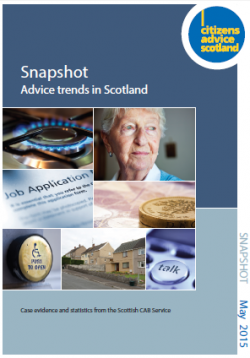
Snapshot uses bureau evidence to act as an early warning system of where policies and practices are failing or inefficient. These quarterly briefings use very recent evidence and will be an excellent way of spotting trends in social policy and tracing the impact of recent policy changes. The briefings will be of use to politicians, government departments, the private sector, and third sector organisations – and anyone with an interest in the most important issues facing people in Scotland.
This edition covers advice trends in Scotland during the third quarter of the 2014/15 financial year.
Key findings in this edition of Snapshot (covering October - December 2014) include:
Consumer debt continues to fall in advice demand
The number of consumer debt issues that clients sought advice on decreased by 26% this quarter compared to the same period in the previous year, reflecting an 18 month trend in falling consumer debt issues. This is likely to be related to a squeeze on income and the availability of credit, particularly concerning payday loan debts which are 50% below last year’s levels. However, priority debts, such as rent and council tax arrears, remain high.
Personal Independence Payment (PIP) issues are increasing
Issues related to the Personal Independence Payment (PIP), the new disability benefit, are increasing quickly at bureaux, with many clients experiencing significant delays in their assessments. It is likely that PIP will become the biggest area of advice need in bureaux during the roll out.
Food parcel issues are now in the top 10 advice areas
There were 1,881 new food parcel issues recorded in this quarter, the highest number yet recorded by bureaux in Scotland. This is more than double the number recorded in the same period in the previous year. There was around 1 new food parcel issue for every 33 clients that sought advice in this period.
Employment continues to increase in advice demand
Employment issues increased by 10% in this period compared to the previous year with issues relating to pay & entitlements (+20%), terms & conditions (+20%) and dismissal (+11%) all showing increases in advice need.
Longer-term trends
All of the above trends represent both quarterly trends and longer-term trends (ie. over the last 18 months). This means that they are unlikely to be quickly resolved and are now seen as part of the established advice landscape. In the last 18 months, we have seen benefits taking up an increasing proportion of advice need, the problematic rise in PIP issues, the rapid increase in employment issues following the introduction of tribunal fees, and a range of issues contributing towards the increase in food parcel referrals. It appears that these issues are here to stay.
If you have any questions regarding the report, or would like to know more, please contact Keith Dryburgh, Policy Manager, on 0131 550 1015 or at keith.dryburgh@cas.org.uk